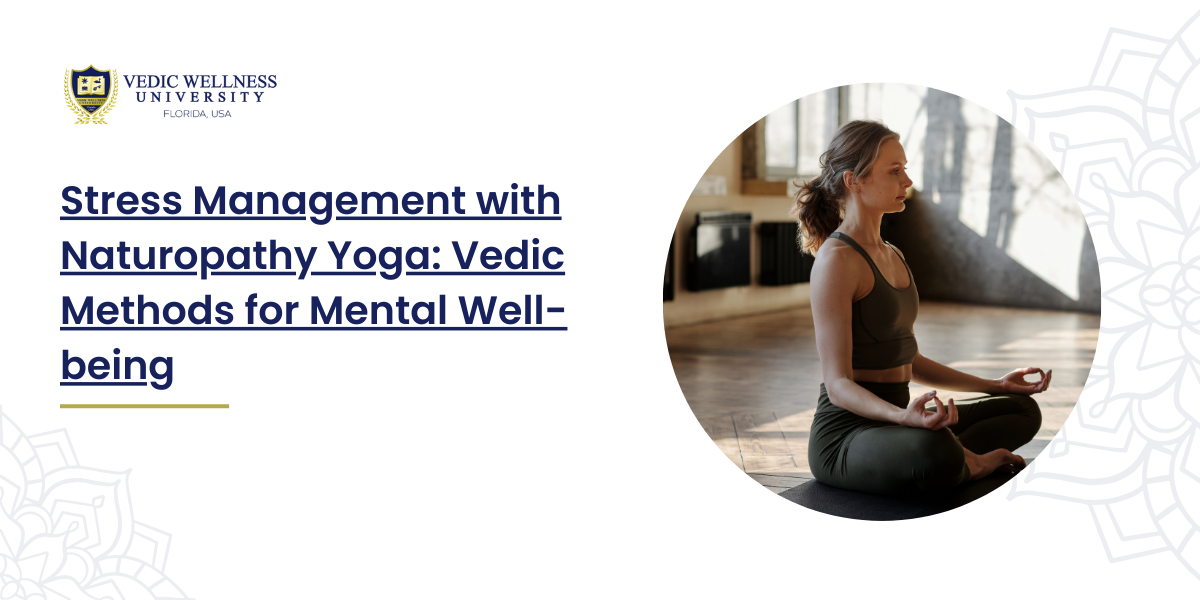Introduction
“स्वस्थस्य स्वास्थ्य रक्षणं, आतुरस्य विकार प्रशमनं च।”
(Swasthasya Swasthya Rakshanam, Aturasya Vikar Prashamanam Cha)
“To maintain the health of the healthy and to cure the diseases of the sick.”
- Charaka Samhita
This ancient shloka from the Charaka Samhita perfectly encapsulates the essence of Ayurveda and Naturopathy Yoga. The holistic approach of these practices focuses on maintaining health and preventing diseases by harmonizing the body, mind, and spirit.
The Life of Ancient Indians and Evolution of Ayurveda and Naturopathy
Ancient Indians lived in harmony with nature, following lifestyles that were closely aligned with the natural world. Their daily routines, diets, and medicinal practices were deeply rooted in the principles of Ayurveda, an ancient system of medicine that emphasized balance and holistic well-being. Ayurveda, meaning “the science of life,” provided comprehensive guidelines on diet, lifestyle, and treatments to maintain health and prevent diseases.
The origins of Ayurveda can be traced back to the Vedas, particularly the Atharva Veda, which contains hymns and rituals associated with healing. Over time, this knowledge was compiled and expanded upon by ancient sages, resulting in classical texts such as the Charaka Samhita and Sushruta Samhita. These texts laid the foundation for Ayurvedic practices and introduced the concept of Doshas (Vata, Pitta, and Kapha) that govern the physiological and psychological functions of the body.
Parallel to Ayurveda, naturopathy emerged as a complementary approach to healing, emphasizing the body’s inherent ability to heal itself through natural means. Naturopathy incorporates elements of Ayurveda, yoga, dietetics, and lifestyle counseling to promote health and well-being.
Understanding Naturopathy
Naturopathy is a holistic approach to health and wellness that focuses on natural remedies and the body’s intrinsic ability to heal itself. It is grounded in several core principles:
- The Healing Power of Nature: Naturopathy believes in the body’s innate ability to heal itself. Natural remedies and treatments are used to support and enhance this healing process.
- Identify and Treat the Cause: Instead of merely addressing symptoms, naturopathy seeks to identify and treat the underlying cause of illness.
- First Do No Harm: Naturopathic treatments are non-invasive and avoid harmful interventions, prioritizing the safety and well-being of the patient.
- Doctor as Teacher: Naturopaths educate patients about their health and encourage them to take an active role in their healing process.
- Treat the Whole Person: Naturopathy considers all aspects of a person’s health, including physical, mental, emotional, and spiritual well-being.
- Prevention: Emphasis is placed on preventing illness and promoting long-term health through lifestyle and dietary modifications.
The origins of naturopathy can be traced back to ancient healing traditions that utilized natural elements such as water, herbs, and sunlight. In modern times, naturopathy has evolved to incorporate scientific advancements while staying true to its core principles. Naturopaths use a variety of treatments, including dietary changes, herbal medicine, hydrotherapy, and physical therapies, to support the body’s healing processes.
Yoga and Its Integration with Naturopathy
Yoga, with its origins in ancient India, is a practice that encompasses physical postures (asanas), breath control (pranayama), meditation (dhyana), and ethical principles (yamas and niyamas). The primary goal of yoga is to achieve a state of physical, mental, and spiritual harmony. The practice of yoga is mentioned in various ancient texts, including the Vedas, Upanishads, and the Yoga Sutras of Patanjali, which systematically outline the philosophy and practice of yoga.
“योगः कर्मसु कौशलम्”
(Yogah Karmasu Kaushalam)
“Yoga is skill in action.”
- Bhagavad Gita 2.50
This shloka from the Bhagavad Gita emphasizes the importance of practicing yoga in daily life to achieve skill and balance in all actions.
The integration of yoga with naturopathy is a natural synergy, as both practices share common principles of holistic health and natural healing. Here’s how yoga complements naturopathy:

Benefits of Naturopathy Yoga for Stress Management
- Physical Health: Yoga asanas improve flexibility, strength, and posture. They stimulate various body systems, enhancing circulation, digestion, and the functioning of the endocrine and immune systems. Regular practice of yoga asanas can alleviate physical ailments and promote overall vitality.
- Mental Health: Pranayama (breath control) and meditation are integral components of yoga that help calm the mind, reduce stress, and enhance mental clarity. Techniques such as Anulom Vilom (alternate nostril breathing) and Bhramari (bee breath) are particularly effective in managing anxiety and promoting mental peace.
- Emotional Balance: Yoga encourages mindfulness and self-awareness, helping individuals manage their emotions more effectively. Practices like meditation and mindfulness reduce the impact of negative emotions and foster a positive outlook on life.
- Spiritual Growth: Yoga is a path to self-realization and spiritual growth. It helps individuals connect with their inner selves and cultivate a sense of inner peace and contentment. This spiritual dimension complements the naturopathic principle of treating the whole person.
- Lifestyle Integration: Yoga promotes a holistic lifestyle that aligns with naturopathic principles. This includes a balanced diet, adequate rest, regular physical activity, and practices that support mental and emotional well-being.
Integrating naturopathy yoga into daily routines offers numerous benefits for stress management. Here are ten key benefits:
- Reduces Stress Hormones: Naturopathy yoga lowers the levels of cortisol, the primary stress hormone, in the body. Regular practice helps in maintaining a balanced hormonal state, reducing stress and anxiety.
- Improves Sleep Quality: Yoga and naturopathic practices promote relaxation and improve sleep patterns. Techniques like Shavasana (corpse pose) and yoga nidra (yogic sleep) induce deep relaxation and improve the quality of sleep.
- Enhances Mood: Yoga stimulates the production of endorphins, the body’s natural mood lifters. This leads to a reduction in symptoms of depression and anxiety, enhancing overall mood and well-being.
- Boosts Immune Function: The holistic approach of naturopathy yoga strengthens the immune system, making the body more resilient to stress and illness.
- Increases Mindfulness: Yoga and meditation practices enhance mindfulness, which helps individuals stay present and manage stress more effectively. Mindfulness reduces the tendency to overthink and worry about the future.
- Promotes Emotional Stability: Regular practice of yoga and naturopathic principles fosters emotional balance, helping individuals manage their reactions to stressors and maintain a calm demeanor.
- Supports Digestive Health: Stress often affects digestive health. Naturopathy yoga supports healthy digestion through specific asanas and dietary practices that reduce gastrointestinal stress and discomfort.
- Encourages Healthy Lifestyle Choices: The principles of yoga and naturopathy encourage individuals to adopt healthier lifestyle choices, such as a balanced diet, regular exercise, and adequate rest, which collectively reduce stress.
- Improves Concentration and Focus: Yoga enhances cognitive functions, including concentration and focus. This helps in managing stress by improving productivity and reducing the mental clutter that often accompanies stressful situations.
- Facilitates Detoxification: Yoga and naturopathic practices promote detoxification of the body through improved circulation, lymphatic drainage, and digestive health. Detoxification helps in reducing the physical and mental burden of stress.
Conclusion
The integration of naturopathy yoga offers a powerful and holistic approach to stress management, blending ancient wisdom with modern practices. By harmonizing the body, mind, and spirit, these practices provide a comprehensive pathway to mental well-being and overall health.
“सर्वे भवन्तु सुखिनः, सर्वे सन्तु निरामयाः।”
(Sarve Bhavantu Sukhinah, Sarve Santu Niramayah)
“May all beings be happy, may all beings be free from disease.”
- Brihadaranyaka Upanishad 1.4.14
Embracing the principles of naturopathy yoga can lead to a balanced, healthy, and fulfilling life, empowering individuals to navigate the challenges of modern life with resilience and grace. At Vedic Wellness University, we are dedicated to promoting these timeless practices and integrating them with contemporary education to foster a global community of well-being and harmony.


